
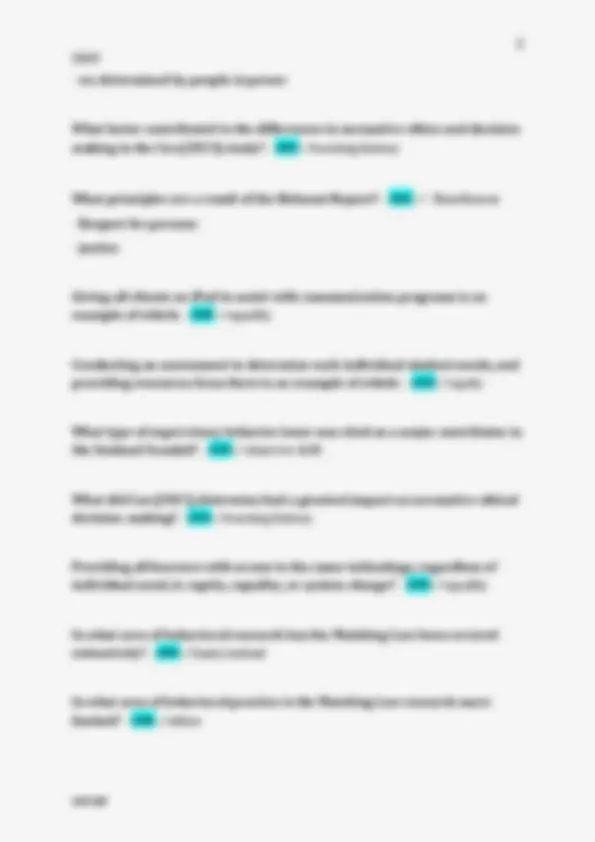
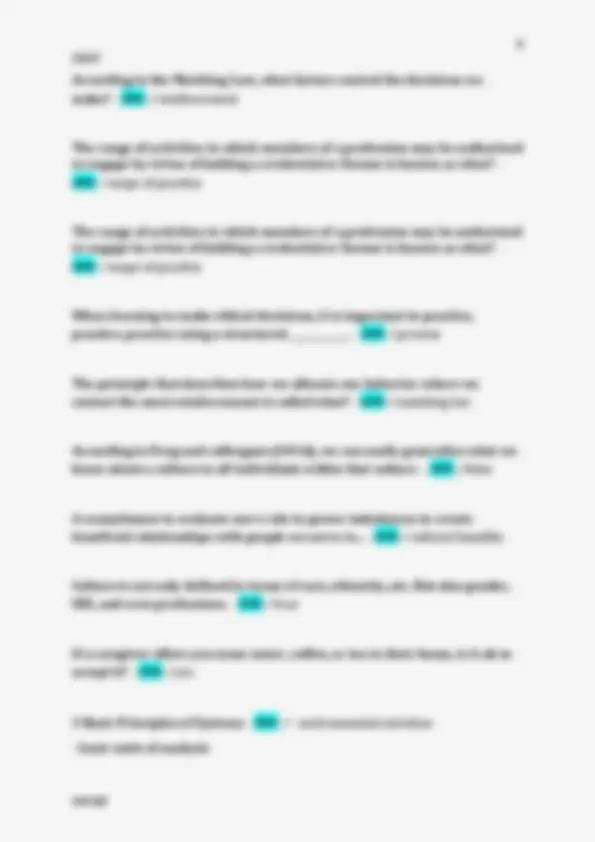
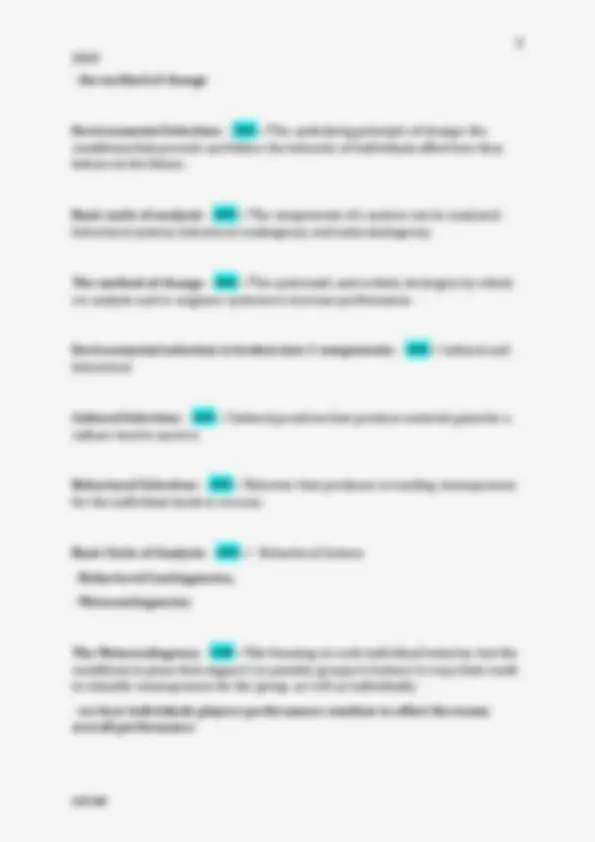
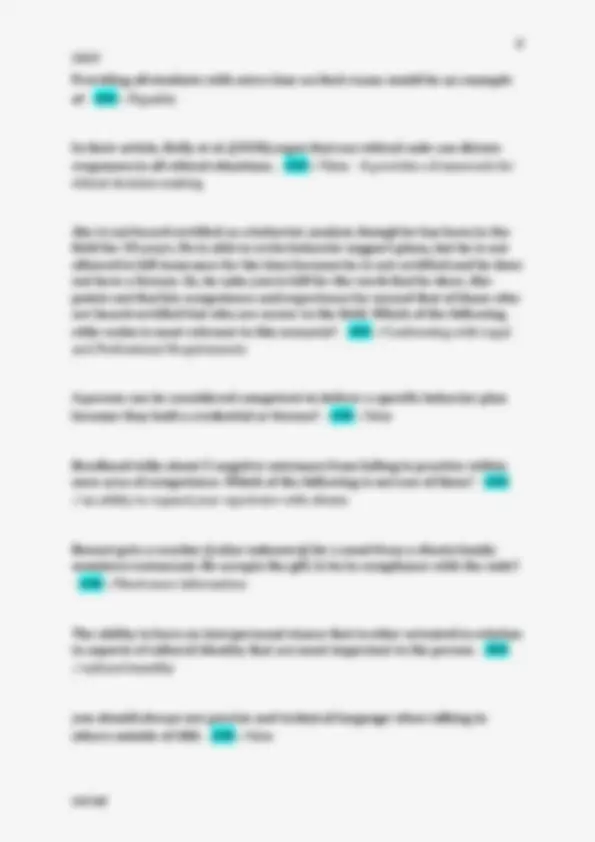
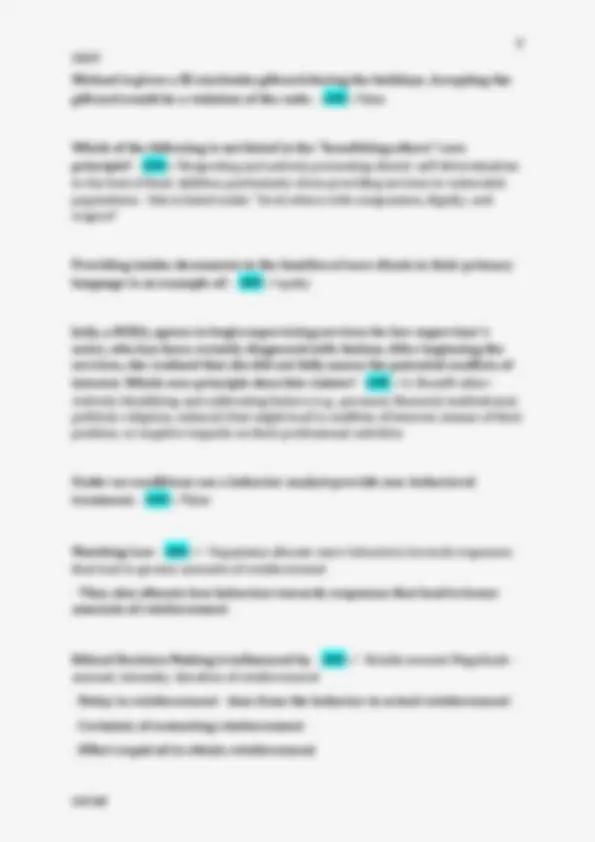
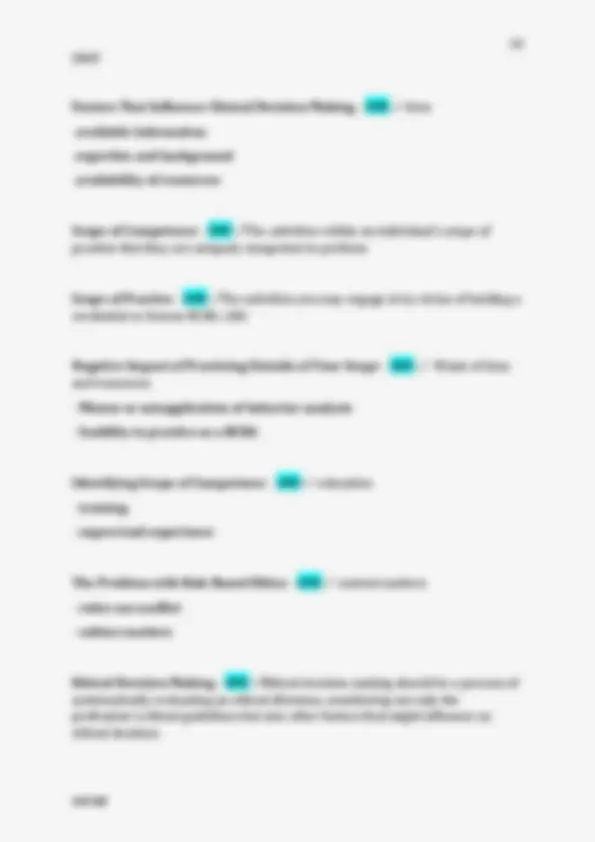
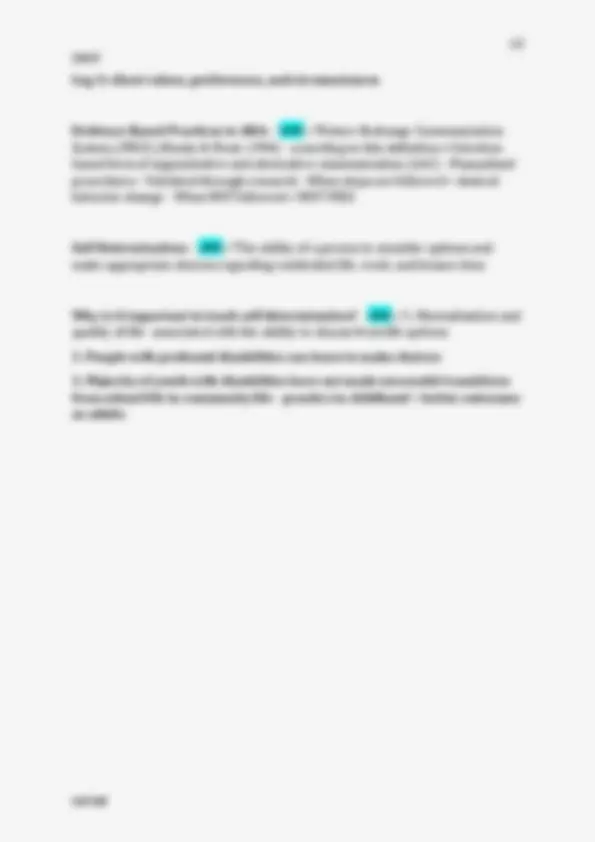


Study with the several resources on Docsity

Earn points by helping other students or get them with a premium plan


Prepare for your exams
Study with the several resources on Docsity

Earn points to download
Earn points by helping other students or get them with a premium plan
Community
Ask the community for help and clear up your study doubts
Discover the best universities in your country according to Docsity users
Free resources
Download our free guides on studying techniques, anxiety management strategies, and thesis advice from Docsity tutors
A comprehensive set of questions and answers covering key concepts in applied behavior analysis (aba), particularly focusing on ethical considerations, principles, and applications. It explores topics such as the hippocratic oath, ethical paradigms, the matching law, and systems analysis, offering insights into the field's history, core principles, and practical implications. Valuable for students studying aba, providing a structured framework for understanding and applying ethical principles in practice.
Typology: Exams
1 / 13

This page cannot be seen from the preview
Don't miss anything!








Habilitation - ANS ✓Teaching the skills necessary for clients to live as independently as possible UNCOERCED SELECTION - ANS ✓no programmed implicit or explicit consequences for selecting one alternative over the others except for the characteristics of the alternatives themselves Assent - ANS ✓Vocal or non-vocal verbal behavior that can be taken to indicate willingness to participate in research or behavioral services by individuals who cannot provide informed consent (e.g., because of age or intellectual impairments) Consent - ANS ✓The permission given by an individual with the legal right to consent before participating in services or research, or allowing their information to be used or shared. Core Principles of ABA - ANS ✓- Benefit others
Hippocratic Oath - ANS ✓was developed, which focused on qualities of a good physician and behavioral expectations; still used today What was a major behavioral factor from the supervisors at the root of the Sunland (and many other) scandals? - ANS ✓supervisor/leader behavior - observer drift Two branches of ethical behavior - ANS ✓Descriptive and Normative Descriptive Ethics: - ANS ✓Focuses on WHAT is considered right or wrong, usually found in rules (whether spoken or unspoken) Normative Ethics: - ANS ✓Focuses on WHY behavior is considered right or wrong. Includes a focus on 3 different ethical paradigms... Ethical Paradigms influencing ABA Ethics Codes - ANS ✓- Virtue Theory
According to the Matching Law, what factors control the decisions we make? - ANS ✓reinforcement The range of activities in which members of a profession may be authorized to engage by virtue of holding a credential or license is known as what? - ANS ✓scope of practice The range of activities in which members of a profession may be authorized to engage by virtue of holding a credential or license is known as what? - ANS ✓scope of practice When learning to make ethical decisions, it is important to practice, practice, practice using a structured ____________. - ANS ✓process The principle that describes how we allocate our behavior where we contact the most reinforcement is called what? - ANS ✓matching law According to Fong and colleagues (2016), we can easily generalize what we know about a culture to all individuals within that culture. - ANS ✓false A commitment to evaluate one's role in power imbalances to create beneficial relationships with people we serve is... - ANS ✓cultural humility Culture is not only defined in terms of race, ethnicity, atc. But also gender, SES, and even professions. - ANS ✓true If a caregiver offers you some water, coffee, or tea in their home, is it ok to accept it? - ANS ✓yes 3 Basic Principles of Systems - ANS ✓- environmental selection
When working with non-vocal clients, what do we assess to determine whether they are ok with the treatment we are implementing? - ANS ✓Assent and HRE EBP requires accounting for client preferences and giving clients choices. - ANS ✓true In order to teach clients to make choices, we can implement what type of teaching strategy, according to Schloss et al (1993)? - ANS ✓shaping When we evaluate the acceptability of our goals, procedures, and outcomes, we are assessing... - ANS ✓social validity Deontology argues that context in addition to the function of behavior must be considered before deciding what is "right" or "wrong" - ANS ✓true Which of the following is not one of the main principles that came about as a result of unethical research practices? - ANS ✓Honesty Which of the following are listed as core principles in the 2020 version of the BACB's Ethics Code for Behavior Analysts? - ANS ✓behave with integrity, seek to benefit others, Providing a free, structured after school study program for students from low income households who do not have access to quiet spaces to complete their homework is an example of: - ANS ✓equity There is a lot of applied research on ethical decision-making choice behavior. - ANS ✓false - There is a lot of research on CHOICE MAKING, but little on ethical decision making
Providing all students with extra time on their exam would be an example of - ANS ✓Equality In their article, Kelly et al. (2020) argue that our ethical code can dictate responses to all ethical situations. - ANS ✓False - It provides a framework for ethical decision making Abe is not board certified as a behavior analyst, though he has been in the field for 20 years. He is able to write behavior support plans, but he is not allowed to bill insurance for his time because he is not certified and he does not have a license. So, he asks you to bill for the work that he does. Abe points out that his competence and experience far exceed that of those who are board certified but who are newer to the field. Which of the following ethic codes is most relevant to this scenario? - ANS ✓Conforming with Legal and Professional Requirements A person can be considered competent to deliver a specific behavior plan because they hold a credential or license? - ANS ✓false Brodhead talks about 3 negative outcomes from failing to practice within ones area of competence. Which of the following is not one of them? - ANS ✓an ability to expand your repertoire with clients Bennet gets a voucher (value unknown) for a meal from a clients family members restaurant. He accepts the gift. Is he in compliance with the code?
Factors That Influence Clinical Decision Making - ANS ✓-time
Culture - ANS ✓the extent to which a group of individuals engage in overt and verbal behavior reflecting shared behavioral learning histories, serving to differentiate the group from other groups, and predicting how individuals within the group act in specific setting conditions Diversity - ANS ✓The practice or quality of including or involving people from a range of different social and ethnic backgrounds and of different genders, sexual orientations, etc Cultural Awareness - ANS ✓Encompasses the ability for one to examine their own cultural beliefs and values and understand how the culture of others can shape behaviors and interactions with others. Cultural Competence - ANS ✓Capability to develop an awareness of one's cultural beliefs, values, and biases while acquiring knowledge of the norms and behaviors of other cultures and displaying professional skills that combine awareness and knowledge of said cultures Cultural Humility - ANS ✓Focus is on individuals and organizations to examine culture and recognize continual learning as practitioners from other cultures, that we do not know everything and need to learn from the client. It is the ability to maintain an interpersonal stance where the practitioners is "other-oriented" and is learning about cultural identity that is most important to the CLIENT. Cultural humility often encompasses self reflection and personal critique and is a lifelong process. Cultural Awareness - ANS ✓• Recognize your values shaped by culture • Understand that others may have different views • Able to label some history, beliefs, behaviors values of different cultures Cultural competence - ANS ✓Builds knowledge • Demonstrates skills based on knowledge • Suggests that you can learn everything about a culture
Leg 3: client values, preferences, and circumstances Evidence Based Practices in ABA: - ANS ✓Picture Exchange Communication System (PECS) (Bondy & Frost, 1994) - according to this definition • Selection based form of augmentative and alternative communication (AAC) - Manualized procedures - Validated through research - When steps are followed = desired behavior change - When NOT followed = NOT PECS Self Determination: - ANS ✓The ability of a person to consider options and make appropriate choices regarding residential life, work, and leisure time Why is it important to teach self determination? - ANS ✓1. Normalization and quality of life- associated with the ability to choose from life options